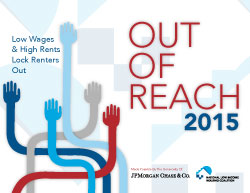Low Wages and High Rents Lock Renters Out Across the Country
May 19, 2015
 CONTACT: Blaire Hoffman, [email protected], 202-662-1530 ext. 230
CONTACT: Blaire Hoffman, [email protected], 202-662-1530 ext. 230
Washington, D.C. – The National Low Income Housing Coalition’s Out of Reach 2015 report reveals that the tightening rental market is making it increasingly difficult for low income renters to find decent, affordable apartments all across the country. The 2015 National Housing Wage is $19.35, meaning that someone working full-time, 40 hours a week, would need to earn $19.35 per hour in order to afford a modest two-bedroom rental unit while spending no more than 30% of household income on housing costs. In 13 states and the District of Columbia, the Housing Wage is more than $20 per hour.
The 2015 Housing Wage is now 2.7 times the federal minimum wage of $7.25. There is no state in the country where someone earning either the state or federal minimum wage can afford even a one-bedroom apartment renting at the HUD Fair Market Rent (FMR). In fact, a minimum wage earner would need to work 86 hours per week to afford a modest one-bedroom apartment and 107 hours per week to afford a modest two-bedroom apartment. Even if the minimum wage was raised to $10.10 as President Barack Obama has proposed, it would fall far short of the Housing Wage.
“Raising the minimum wage is a critical step to improving the lives of low income households, but it is not enough,” says NLIHC President and CEO Sheila Crowley. “The data in Out of Reach make it clear that investing in affordable housing is essential to reducing poverty and housing instability in this country.”
There are significant differences between the National Housing Wage of $19.35 and state and county Housing Wages, as well as between metropolitan and non-metropolitan areas, all of which are available in the full Out of Reach 2015 report.
According to Out of Reach 2015, the top five most expensive states are:
- Hawaii, with a Two-Bedroom Housing Wage of $31.61.
- District of Columbia, with a Two-Bedroom Housing Wage of $28.04.
- California, with a Two-Bedroom Housing Wage of $26.65.
- New York, with a Two-Bedroom Housing Wage of $25.67.
- New Jersey, with a Two-Bedroom Housing Wage of $25.17.
Maryland, Massachusetts, Connecticut, Alaska, and Washington finish out the list of top ten most expensive states in 2015.
There are ten metropolitan areas where the Housing Wage is greater than $30 per hour. The most expensive metropolitan area in 2015 is San Francisco, CA, where someone would have to earn close to $40 an hour to afford a decent two-bedroom rental unit.
There were more than 42 million renter households in the U.S. in 2013 and one in every four have incomes at or below 30% of the area median income. These households experience the greatest housing instability and risk of homelessness. They only can afford rents of $509 a month, far less than the two-bedroom FMR of $1,006 or the one-bedroom FMR of $806. The National Low Income Housing Coalition calculates that there are just 31 affordable and available units for every 100 extremely low income renter households.
“Partisan paralysis in Congress makes it nearly impossible to raise the federal minimum wage or increase funding for HUD programs such as Housing Choice Vouchers and Public Housing,” says Crowley. “And yet the market continues to fail to provide affordable homes for the lowest income households. When the market fails to provide for such a basic human need as housing, government must close the gap.”
The National Low Income Housing Coalition concludes that the strongest solution to the affordable housing crisis is the National Housing Trust Fund. The National Housing Trust Fund will provide communities with funds to build, preserve, rehabilitate and operate rental homes that are affordable for extremely low income households.
Extensive data for every state, metropolitan area, and county in the country are available online at www.nlihc.org/oor.
Established in 1974 by Cushing N. Dolbeare, the National Low Income Housing Coalition is dedicated solely to achieving socially just public policy that assures people with the lowest income in the United States have affordable and decent homes
National Low Income Housing Coalition
1000 Vermont Avenue NW, Suite 500, Washington DC 20005
202/662-1530; Fax 202/393-1973; [email protected], www.nlihc.org